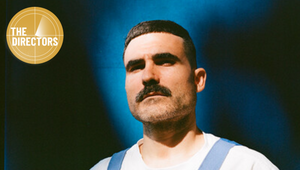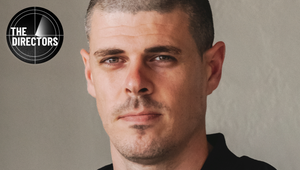
Wes Anderson, ‘The Office US’ and ‘Stage Beyond Boarders’ The Work That Made Ester Dus

Ester Dus is a director and motion designer. After four years at an independent advertising agency where she worked as an art director and motion designer, she joined Device Animation Studio.
At Device, she has worked on campaigns for brands like Oysho, Louis Vuitton, and YouTube. She combines her professional work with teaching: she is a professor of art direction at Brother Escuela de Creativos and head coach of the B. Art course, where she trains the next generation of creatives.
She is particularly interested in sharing tools for visual conceptualisation, developing aesthetic judgment, and simply communicating complex ideas.
In her projects, she explores hybrid processes combining frame-by-frame animation, motion, AI, and analogue interventions – investigating how to manipulate the animated frame to give it a unique texture.
In her most personal work, she explores the duality between fragility and strength, with a visual sensitivity that blends simplicity, geometry, and warm visual storytelling, alongside retro aesthetics, magical realism, and traditional techniques reinterpreted through a digital lens.
Ester sat down with LBB to look back on early obsessions with ‘Art Attack’ as well as the influence of Karlotta Freier and Alexis Jamet’s work…
LBB> The ad/music video from my childhood that stays with me…
Ester> If I had to choose a music video from my childhood, it would definitely be ‘Barbie Girl’ by Aqua. There was something about it that fascinated me then and still fascinates me now.
Of course, I was a little girl, and seeing that toy world come to life was impossible not to get hooked on – it was candy for a child. It was exaggerated and shiny, and the editing used transitions and techniques typical of ‘90s intros, which I must have already liked back then.
LBB> The ad/music video/game/web platform that made me want to get into the industry…
Ester> A show that marked my childhood was ‘Art Attack’. I would have loved to be one of the kids who got to show their creations. I tried making a lot of the crafts, even if they never turned out the same. It was definitely a space that let me imagine myself as an artist, and I never stopped aiming to work on something that allowed me to have fun making beautiful things.
LBB> The creative work that I keep revisiting…
Ester> With this question, I feel like I can go down two paths – one of aesthetics and one of emotional attachment.
If we focus on aesthetics, it’s not a surprising answer, but for me, Wes Anderson’s stop-motion films are a true masterclass in both technique and taste. Every frame is flawless, and the characters take on another dimension.
In ‘Fantastic Mr. Fox’ and ‘Isle of Dogs’, I feel the characters have a lot of soul, deep internal conflict, and within the beauty of their worlds, there’s always something dark, weird, and uncomfortable that draws me in.
If we focus on emotional attachment, honestly, I rewatch ‘The Office US’ almost every year – sometimes the whole thing, sometimes just parts – but there’s not a year that goes by where I don’t revisit it at some point.
The writing and characters can brighten up any heavy day, and yes, it also deals with awkwardness, things you’d rather avoid, silences, sideways glances, and secondhand embarrassment.
LBB> My first professional project…
Ester> I don’t really remember which one was first. I started working as soon as I began university, using what I learned from YouTube tutorials.
It was probably some explainer video I got paid very little for, despite working many hours on it. I started early because I was eager, had a bit of a knack for it, and loved learning After Effects. Any excuse to practice was a good one – especially if it was paid.
I’d probably be a bit embarrassed to look at those early works now, but without them, I wouldn’t know what I do today.
LBB> The piece of work that made me so angry that I vowed never to make anything like that…
Ester> Ugh, there are so many – but I still do them, and I’ll keep doing them as long as I need money to live. In advertising, you have some control, but never as much as you’d like.
You always try to push the vision of the director or studio, but the final result depends so much on how open the client (and sometimes intermediaries) is, that for me it’s impossible to say a final piece turned out exactly how I wanted. These ‘unicorn’ moments happen very rarely.
LBB> The piece of work that still makes me jealous…
Ester> Rather than specific pieces, there are many artists I admire for their delicacy, unique language, and the way they tell stories through illustration and animation.
For example, Karlotta Freier’s piece for Hermès seems absolutely beautiful to me. I think it’s very well optimised – everything that’s animated is beautifully done, and there’s no excess. The scenes feel suspended, contemplative, and reveal the universe she has built with her style, palette, and line. It feels very balanced, and you’re left wanting more.
I feel something similar about Alexis Jamet’s work. I love how he creates textures and atmospheres using smudges, grain, and subtle movement. His blend of analogue and digital techniques is deeply inspiring.
LBB> The creative project that changed my career…
Ester> I couldn’t name one specific project. For me, it was a combination of small projects – none of them groundbreaking – but they showed that I had enough taste and technique to make the jump from art director and motion designer at an agency to working at Device. Maybe the real career-changing project is still ahead.
LBB> The work that I’m proudest of…
Ester> For me, it’s still ‘Stage Beyond Borders’, a very small cultural project where I got the chance to direct for the first time at the studio. It’s the one I’m proudest of because I didn’t yet know what was possible in that role, and it made me realise it was exactly what I wanted to do with my career.
LBB> I was involved in this, and it makes me cringe…
Ester> A lot from my time in advertising agencies. It was a job where I sometimes got to shine, but that wasn’t the norm. It’s a sector where clients have annual fees, so often the job becomes making those annoying banners that pop up when you’re browsing a website.
LBB> The recent project I was involved in that excited me the most…
Ester> It wasn’t a project per se, but a pitch (let’s say for a fast food chain), where we got really motivated and had amazing synergy with the art department to grow the ideas the client initially proposed.
Many projects we’ve been passionate about end at this phase, and it’s a shame not to see them finished, because the idea that lingers is always, ‘That could have been an incredible project’.















